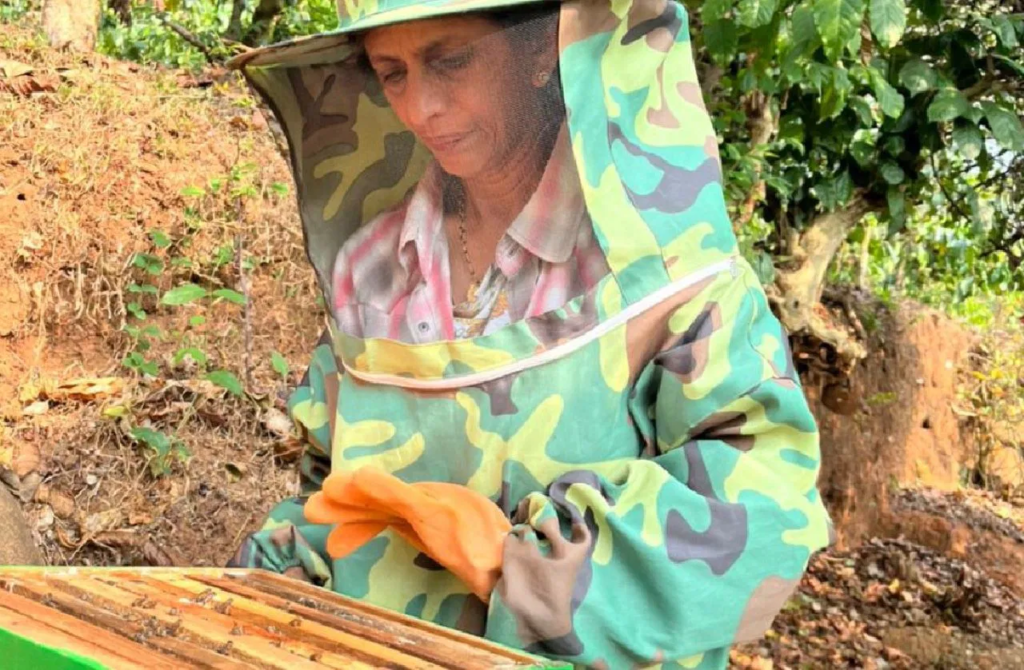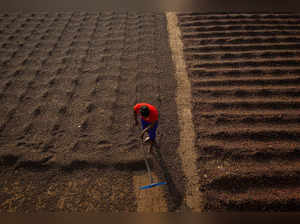
Anitha Nanda Appanervanda, a 61-year-old coffee farmer from Coorg, Karnataka, stands as a symbol of determination, sustainability, and empowerment. Over the course of her 22-year journey, Anitha has not only established a successful coffee farm but has also transformed the lives of hundreds of women in her community, fostering a culture of eco-friendly farming practices.
A passion for farming rooted in childhood
Born and raised in Bengaluru, Anitha’s passion for farming took root in her childhood. Every school vacation, she would visit her grandfather’s coffee estate in Coorg, a place that quickly became her second home. The vast expanse of coffee plants, the rich biodiversity, and the sense of peace found in the hills left an indelible mark on her young mind. “From those early days, I knew I wanted to return to the hills and be part of coffee farming,” she fondly recalls. This deep connection to the land paved the way for her lifelong dedication to sustainable agriculture.
Her dream started to take shape after she married Nanda Belliappa, a fellow coffee farmer from Coorg. Together, they took over the family-owned Surya Kiran Estate, where Anitha embarked on her mission to blend her passion for farming with eco-friendly practices.
Despite her enthusiasm, the road to success was not easy. In the early years, Anitha and her husband faced numerous challenges. Coffee farming requires patience, and the couple struggled to produce good harvests from their robusta coffee plants. “It took almost 10 years before we saw good yields,” she shares, highlighting the perseverance and dedication it took to build the farm.

Their breakthrough came when they adopted intercropping techniques, blending coffee cultivation with black pepper. This method not only boosted productivity but also contributed to a more sustainable farming system. Today, they cultivate 110 acres of robusta and 40 acres of arabica coffee, a testament to their hard work and commitment to innovation in farming.
Anitha’s approach to farming is deeply rooted in her desire to protect the environment. Situated in the biodiversity-rich region of Coorg, her coffee estate is more than just a farm – it is a sanctuary for wildlife. Her coffee plants grow under the protective canopy of rainforest trees, a practice known as shade-grown coffee farming. This method helps maintain the natural balance of the ecosystem, providing shelter for birds, insects, and other wildlife.
“We must protect this land from climate change and global warming,” she asserts, emphasising the role that sustainable practices play in preserving the environment for future generations. Anitha’s farm has been awarded Rainforest Alliance Certification, recognising her dedication to eco-friendly farming.
While she remains deeply connected to traditional farming methods, Anitha is not afraid to embrace modern technology when it benefits the farm. She uses machines for irrigation and weeding, which helps reduce labour and improve efficiency. However, the core of her farming philosophy remains grounded in traditional practices that have been passed down through generations.
Anitha’s success is not just about coffee. She has diversified her farm by growing black pepper and areca nuts, a strategy that has made her farm more resilient and sustainable. This diversification has allowed her to reduce dependency on a single crop and has opened up new streams of income for her family.
Empowering women and building a community
Anitha’s contributions go far beyond her own farm. As an active member of Biota Coffee FPC and the secretary of the Codagu Women’s Coffee Awareness Body (CWCAB), she has empowered around 400 women in her community. This group, which was founded in 2002 during a time when coffee prices were low, has provided women with the support they need to embrace eco-friendly farming practices and achieve fair prices for their crops.
For Anitha, farming is not just a livelihood – it’s a community effort. Through CWCAB, she has helped women coffee farmers promote sustainable farming and spread awareness about the benefits of coffee. Each year, on International Coffee Day, they celebrate by giving away free coffee to locals and tourists, a gesture that symbolises their pride in the hard work that goes into every cup.
Anitha’s dedication to sustainable farming has not gone unnoticed. In 2020, she received a Certificate of Appreciation from the Indian Institute of Spices Research (ICAR-IISR) for her pioneering work in intercropping black pepper with coffee. “It was a proud moment,” she recalls, noting that it validated the years of effort she had poured into her farm.
Despite her success, Anitha continues to innovate and learn. She has recently taken up beekeeping, recognising the crucial role bees play in pollination and the overall health of her farm. This new venture is another example of her commitment to maintaining a healthy, balanced ecosystem.

Coffee Farming: A source of Income and Sustainability
Sustainable farming has proven to be both environmentally and financially rewarding for Anitha. She cultivates robusta coffee, which has been particularly profitable in recent years. Producing around 19-20 bags per acre, she earns Rs. 10,000 per bag, while her arabica parchment fetches a higher price at Rs. 16,000 per bag. This strong financial return is a direct result of her commitment to eco-friendly practices.
While she does use some fertilisers, Anitha avoids harmful chemicals, focusing instead on maintaining native trees and enhancing soil health. Her approach blends the best of traditional and modern farming methods, ensuring that her land remains fertile and productive for generations to come.
A legacy of passion and purpose
Anitha Nanda’s journey from city life to becoming a successful coffee farmer in Coorg is a testament to her passion for the land and her determination to create a better future for her community. Through her sustainable farming practices, she has not only preserved Coorg’s rich biodiversity but has also empowered hundreds of women to take control of their livelihoods.
For Anitha, coffee is not just a crop – it’s a legacy, a connection to her roots, and a vision for a sustainable future. Her story is a powerful reminder that with hard work, care for the environment, and a strong community, anything is possible.
source: http://www.theorganicmagazine.com / The Organic Magazine / Home / by Tanishq Verma






